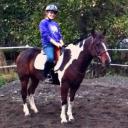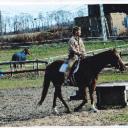Yahoo Answers is shutting down on May 4th, 2021 (Eastern Time) and beginning April 20th, 2021 (Eastern Time) the Yahoo Answers website will be in read-only mode. There will be no changes to other Yahoo properties or services, or your Yahoo account. You can find more information about the Yahoo Answers shutdown and how to download your data on this help page.
Trending News
Suggested post-gelding exercise routine?
I'm taking on a 4-year old colt as a volunteer/partnership with the humane society who is on the list of horses to be put down soon. He's such a sweetheart, and is relatively handle-able, but he still has his balls.
We're going to pick a date to geld him soon, but I've been hearing some mixed rumors about the post-gelding exercise routine I should implement. One gal at the humane society told me he needs to be lunged three times a day for the first week or so after the surgery, but she has very little experience with horses and I'm not sure where she got her information. We plan on also asking the vet when he comes out to do the procedure, but as far as planning my schedule logistically, I'd like to have an idea ahead of time.
For a 4-year old rescue colt with an unknown past, what do you guys recommend for an exercise program for the first few weeks after his castration surgery?
Thanks!
Thanks so much for your help, guys. I think this guy has a bright future now that my friend and I have agree to take him on until he's trained enough for people to want to adopt him.
5 Answers
- Starlight 1Lv 77 years agoFavorite Answer
First, IGNORE that idiot at HSUS who told you to longe the horse 3 times a day after he's cut (gelded). She's an IDIOT who has no idea what she's talking about. The horse does need exercise, yes- confinining the animal in a stall with no movement is the worst possible thing you can do for him. If he should happen to be in any way infected, the infection will just build and build until it becomes lethal. As it is, he'll be too sore from the surgery to move around a lot, and you'll have to cold hose him a few times a day for 20 or so minutes at a time, and then hand walk him or even ride him slowly at the walk and trot if he's been saddle trained.
Ignore CJ. What she said about the horse's intestines coming through the surgical site following castration is pure NONSENSE. I have worked with several newly gelded colts over the years, and I have NEVER ONCE HEARD of or seen that happen with any horse. Bleeding is a concern, yes, and you'll want to pay attention and make sure that the horse isn't bleeding excessively- but the odds of the horse having an intestinal slippage like that are extremely remote. There are different methods that are used for gelding, but most commonly, the incision is left open to heal and close on its own. There's less risk of infection that way. Ask for recommendations for aftercare from the vet who does the surgery. Most of the time, you'll be given a prescript for some prophylactic antibiotics, which usually have to be given a couple times a day in the feed. If the horse is sore, you may get told to give the animal a couple grams of bute to keep the swelling and the pain down. But most of all, you'll be told to move the horse around and make sure he keeps exercising at least a little bit, so as to promote healing and closure of the incisions. You'll also need to watch the horse to be sure that he is able to urinate normally after surgery.
One last note: I sincerely hope that you can convince these idiots at HSUS not to put this horse down before he's even had a chance to LIVE. HSUS and PETA are little better than eco-terrorist groups, you know. They work hand in hand, and it's well documented that PETA KILLS far more animals than it helps or saves. I pray that this poor horse won't end up as one of their victims. It's not his fault that whoever bred or owned him waited too long to geld him.
Source(s): Personal experience. I'm a horse owner and professional with 26 years' experience, and I've worked with several newly gelded colts over the years. They all recovered and healed normally. I've never heard of nor seen a case in which a horse suffered intestinal prolapse or slippage following castration surgery. Not saying it couldn't happen, only that I have never seen a case in which it did. - 7 years ago
First, once he is gelded, he needs stall rest for a few days otherwise you risk major issues such as descencion of the intestines through the surgical site.Make sure to talk to the vet and make sure that he has rest, and the wound is healing properly. It needs to be kept clean, and dry, and should not get dirt kicked up in there until after the wound is closed over (so absolutely NO longing). I've gelded 2 of my horses (assisted my vet) one at 2 and one at 3 years old, and my other friend is a vet and assisted a coworkers horse's gelding recovery. There's a lot to make sure goes right and exercise too soon - even limited turnout - can be a HUGE no-no! Give them several days of stall rest, talk to your vet, and find out if they are gelding standing or laying down, and the after effects of the anesthesia as well as any medicinal aftercare. It should be at least a week or more before the horse should go into work at all. Good luck!
- Missy BLv 77 years ago
One of the biggest reasons they need gentle exercise is to move the blood around in their body to keep from getting hematomas (big pockets of blood) and to promote healing.
Horses have a spongey part inside their foot which actually pushes blood back up the leg. They are built to move around most of the time.
I have gelded two adult studs. My vet had me doing 20 minutes of light exercise the first day, then twice a day for 30 minutes, light exercise. Lead him around at a brisk walk, light lunging at a trot, maybe some groundwork like backing up.
After the first week we went back to a lighter version of our normal work schedule. So I would ride for maybe 40 minutes at a walk and trot, rather than an hour or two of walk trot canter jumping etc.
I kept it like this for a while, maybe 3 weeks, and then I started increasing our schedule until we were back to normal.
- RosieLv 77 years ago
Whenever we had one gelded, we were told lots of hand walking to keep swelling down. If there is some swelling, cold hosing is good.
Discuss it and follow your vets directions.
- How do you think about the answers? You can sign in to vote the answer.






